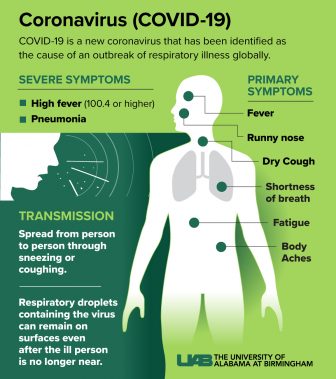UAB Hospital To Open Appointment Only Test Site For COVID-19
Starting Monday, UAB hospital, in partnership with the Jefferson County Department of Health, will offer testing for COVID-19.
Officials say the drive-thru testing center will be located at University Blvd and 22nd St S, at a former Southern Research Institute site.
The center will be open seven days a week, from 9 a.m. to 1:30 p.m. and is by appointment-only. UAB has set up a call-line that will be open seven days a week from 7 a.m. until 11 p.m. Symptomatic patients must call and go through a screening process to set-up an appointment. Patients can call the center starting Sunday at noon. The number is 205-975-1881.
UAB officials anticipate the drive-thru site will be able to test up to 250 people a day.
“That amount is not adequate for the need in the community,” says Jordan DeMoss, Vice President of Clinical Operations at UAB Medicine. “This is our first site that we will be opening. We’re working to align access to testing with the lab capabilities that are expanding across our community and also the testing supplies that are in limited supply across the nation.”
DeMoss says they hope to open additional testing sites in the next few weeks.
UAB’s pathology laboratories began testing internally for COVID-19 on Friday, with limited tests for UAB in-patients, employees and patients in the emergency department.
“We will be testing primarily priority in-patients at UAB Hospital so we can preserve negative pressure rooms,” says Dr. Sixto Leal, a lead researcher in the department of pathology.
Negative pressure rooms are used to isolate patients. They make sure that airborne contaminants, like a virus, don’t leave the contained room and flow throughout the hospital.
UAB’s laboratory-developed test for COVID-19 is similar to the one administered by the Centers for Disease Control and Prevention (CDC). Researchers say they are working with companies like GenMark and Roche to use their equipment and supplies, increasing access to certain testing products that are in short supply.
Across Alabama and nationwide, testing for COVID-19 has been limited, with state and private laboratories overwhelmed by demand and patients frustrated by delayed results.

UAB Health System
Health officials say only people showing symptoms of COVID-19 should be tested for the virus.
Public testing for COVID-19 is also available through the Alabama Department of Public Health, with a health provider’s referral. Additionally, Assurance Scientific Laboratories has set up a drive-through testing site at the Church of the Highlands Grants Mill Campus. Health providers can also order testing through LabCorp or Quest Diagnostics.
In general, experts say only those who are showing symptoms of COVID-19 should be tested. In all cases, they recommend calling a health provider before showing up to a clinic or hospital.
Trump announces ‘major combat operations’ in Iran
Israel and the U.S. have launched strikes against Iran, with explosions reported in Tehran and air raid sirens sounding across Israel.
Trump says he is ‘not happy’ with the Iran nuclear talks but indicates he’ll give them more time
U.S. President Donald Trump said Friday he's "not happy" with the latest talks over Iran's nuclear program but indicated he would give negotiators more time to reach a deal to avert another war in the Middle East.
Bill Clinton says he ‘did nothing wrong’ with Epstein as he faced grilling over their relationship
Former President Bill Clinton told members of Congress on Friday that he "did nothing wrong" in his relationship with Jeffrey Epstein and saw no signs of Epstein's sexual abuse as he faced hours of grilling from lawmakers over his connections to the disgraced financier from more than two decades ago.
Pentagon puts Scouts ‘on notice’ over DEI and girl-centered policies
After threatening to sever ties with the organization formerly known as the Boy Scouts, Defense Secretary Hegseth announced a 6-month reprieve
President Trump bans Anthropic from use in government systems
Trump called the AI lab a "RADICAL LEFT, WOKE COMPANY" in a social media post. The Pentagon also ordered all military contractors to stop doing business with Anthropic.
HUD proposes time limits and work requirements for rental aid
The rule would allow housing agencies and landlords to impose such requirements "to encourage self-sufficiency." Critics say most who can work already do, but their wages are low.







